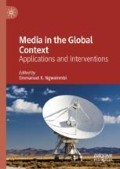Abstract
Terrorism, understood, as the strategic and illegal use of violence to reach goals of either political, ethnic, or religious nature is not new in Africa has been one of the strategies of some of the freedom fighters in Kenya (Mau Mau) and South Africa (ANC) among others. It has taken a religious tone in the insurgent activities of such African terrorist groups as Al-Shabaab in Somalia, Al-Qaeda in the Maghreb, and Boko Haram in Nigeria and Cameroon. The media do not only report about terrorism, and it can determine public perceptions of terrorist groups. Boko Haram (which translates to “no to western education”) is the most severe and dangerous terrorist group in Africa today, and its attacks have been covered extensively in the Nigerian media. This chapter is based on an empirical quantitative and qualitative analysis of how four Nigerian newspapers [Thisday, The Guardians, Vanguard, and Daily Trust of Nigeria] covered Boko Haram attacks. The Functionalist Theory of the Media is used to examine the media’s role of surveillance, correlation, transmission, entertainment, and mobilization in Boko Haram news. Data is gathered from newspaper reports within two weeks of the 2014 incident of the Chibok girls kidnapping in Borno State, Nigeria.
Access this chapter
Tax calculation will be finalised at checkout
Purchases are for personal use only
References
An, S., & Gower, K. K. (2009). How Do the News Media Frame Crises? A Content Analysis of Crisis News Coverage. Public Relations Review, 35(2009), 107–112.
Antwi-Boateng, O. (2017). The Rise of Pan-Islamic Terrorism in Africa: A Global Security Challenge. Politics & Policy, 45(2), 253–284.
Baran, S. J., & Davis, D. K. (2012). Mass Communication Theory: Foundation, Ferment, and Future (6th ed.). Boston, MA: Wadsworth Cengage Learning.
Connor, S., & Wesolowski, K. (2004). Newspaper Framing of Fatal Motor Vehicle Crashes in Four Midwestern Cities in the United States, 1999–2000. Injury Prevention, 10(3), 149.
De Vreese, C. H. (2005). News Framing: Theory and Typology. Information Design Journal & Document Design, 13(1).
Falola, T., & Heaton, M. M. (2008). A History of Nigeria. Cambridge, UK: Cambridge University Press.
Goffman, E. (1974). Frame Analysis: An Essay on the Organization of Experience. Cambridge, MA: Harvard University Press.
Kalu, K. A. (2010). Nigeria: Learning from the Past to Meet the Challenges of the 21st Century. Social Research, 77(4), 1367–1400.
Li, X. (2007). Stages of a Crisis and Media Frames and Functions: U.S. Television Coverage of the 9/11 Incident During the First 24 Hours. Journal of Broadcasting & Electronic Media, 51(4), 670.
McQuail, D. (2010). McQuail’s Mass Communication Theory (6th ed.). London: Sage.
Pham, J. P. (2012, April). African Security Brief: Boko Haram’s Evolving Threat: A Publication of the African Center for Strategic Studies. In F. A. O. Schwarz, Jr. (1965). Nigeria: The Tribes, the Nation, or the Race—The Politics of Independence. London, England: The Massachusetts Institute of Technology Press.
Wilson, S. F. II. (2014). Terrorist Experts’ Perceptions of How the Internet Has Shaped International Terrorism (Order No. 3668962). Available from ProQuest Dissertations & Theses Global (1648432400). Retrieved from https://ezproxy.lib.ndsu.nodak.edu/login?url=, https://search-proquest-com.ezproxy.lib.ndsu.nodak.edu/docview/1648432400?accountid=6766.
Further Reading
Greenberg, B. S. (Ed.). (2002). Communication and Terrorism: Public and Media Responses to 9/11. Cresskill, NJ: Hampton Press.
Norris, P., Kern, M., & Just, M. (2003). Framing Terrorism: The News Media, the Government, and the Public. New York: Routledge.
Ryan, M. (2004). Framing the War Against Terrorism: US Newspaper Editorials and Military Action in Afghanistan. Gazette, 66(5), 363–382.
Woods, J. (2011). Framing Terror: An Experimental Framing Effects Study of the Perceived Threat of Terrorism. Critical Studies on Terrorism, 4(2), 199–217.
Author information
Authors and Affiliations
Editor information
Editors and Affiliations
Rights and permissions
Copyright information
© 2019 The Author(s)
About this chapter
Cite this chapter
Mou-Danha, S. (2019). Media Coverage of the Chibok Girls Kidnapping in Regionally Different African Newspapers. In: Ngwainmbi, E. (eds) Media in the Global Context. Palgrave Macmillan, Cham. https://doi.org/10.1007/978-3-030-26450-5_8
Download citation
DOI: https://doi.org/10.1007/978-3-030-26450-5_8
Published:
Publisher Name: Palgrave Macmillan, Cham
Print ISBN: 978-3-030-26449-9
Online ISBN: 978-3-030-26450-5
eBook Packages: Literature, Cultural and Media StudiesLiterature, Cultural and Media Studies (R0)

